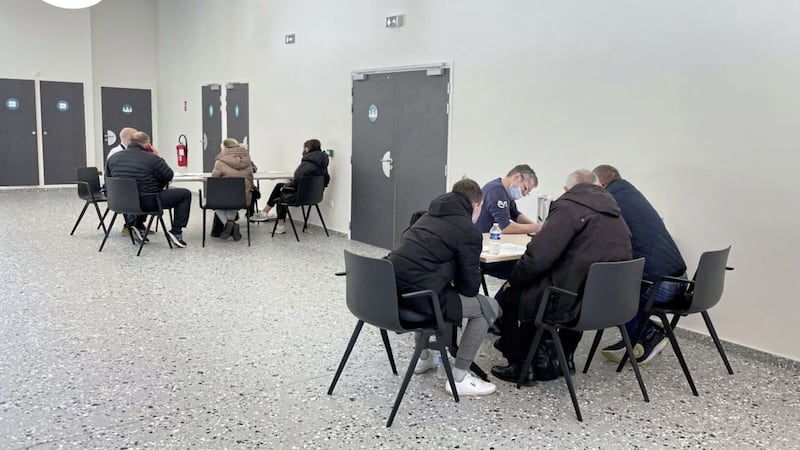The Home Office has tried blaming its fiasco over Ukrainian refugees on the Common Travel Area (CTA), claiming there is a back door into the UK from the Republic that must be kept closed with visa requirements. Legally, this is nonsense: the CTA only applies to British and Irish citizens and is policed at the external frontier of both countries, with further data-sharing between them and checks within them. But that only applies if the system works, a brave hope with the Home Office in charge. In its anonymous briefing, the Home Office cited Albanian criminal gangs exploiting the CTA to bring drugs into Liverpool via Dublin and Belfast, a fact established in a court case last year and a cause of growing concern across England. If the Home Office starts tying all this together as a deflection from its general uselessness, there will be pressure for tougher immigrations checks between Northern Ireland and Britain - in other words, a sea border for people.
**
The UUP found a cynical best of both worlds by voting against Alliance’s integrated education bill while not signing a DUP petition of concern to block it. This is just about defensible on the doorsteps. The bill has some technical issues, although that is hardly unusual, and jumps the gun on the New Decade, New Approach review for a single education system, although that hardly matters, as the review will obviously not deliver a single education system. There is good public awareness of the petition of concern and dislike of it being abused - and in New Decade, New Approach, all parties committed to using it only “in the most exceptional circumstances and as a last resort.”
It was also uncharacteristically canny of the UUP to turn a DUP trap into an escape mechanism. But all this politicking has still done no favours to Doug Beattie’s liberal brand.
**
The churches were as cynical as the UUP in depicting their opposition to Alliance’s bill as a defence of parental choice. Polls consistently show 70 per cent of parents would choose integrated schools if they were available - ten times the current level of provision. The churches have done everything they can to constrain provision, then claimed the low supply of places ‘proves’ there is no demand.
The DUP took this duplicity to Orwellian levels with a statement from Diane Dodds, calling the bill “segregation and elevation of one sector of our education system to the detriment of a majority of children.”
War is peace, freedom is slavery and integration is segregation.
**
When People Before Profit proposed a 10 per cent reduction in private rents two weeks ago, every party except the DUP was too spineless to be seen opposing it and the measure was passed almost by accident. The assembly has now sheepishly annulled the legislation, conceding it was unenforceable and probably unlawful.
However, that does not mean radical housing action is beyond Stormont’s remit.
The Welsh government has announced a 300 per cent council tax rise on second homes, mainly to deter purchasers, who bid up prices for everyone. Existing owners may also start putting properties on the market, pushing prices down.
The executive has complete powers to do the same thing here through the rates. The impact would be most noticeable in coastal areas, where assembly members have complained for years of second homes displacing residents. So why not do something about it?
**
Edwin Poots is to be co-opted from Lagan Valley to South Belfast. Some of the DUP veteran’s more excitable opponents are portraying this as if he were moving from Idaho to Manhattan. In reality, there is little difference between rural Lisburn and liberal Belfast. The council and assembly constituencies even have a substantial overlap in South Castlereagh. It is this similarity that is ominous for the DUP. It topped the poll in South Castlereagh until the 2019 general election, when it was beaten by Alliance.
**
As energy bills soar, the UUP is urging people to “turn down the thermostat”, “keep internal doors closed” and “move furniture away from radiators”.
Politicians need to be careful associating themselves with advice of this nature, due to the very high risk of irritation and ridicule.
The three-day week the Conservative government introduced after the 1973 oil shock is still remembered for the suggestion people share a bath. This was actually made by an English gas company but it caused an image of Ted Heath in the tub to be burned into a horrified nation’s mind.
**
BBC Northern Ireland has asked if rocketing fuel prices will cause people to switch from cars to bicycles. The answer is of course not - we shall take our transport culture from The Dukes of Hazzard until the collapse of civilisation. But the question remains interesting. Denmark and the Netherlands, the world’s top two cycling countries, built their bike culture from scratch in the 1970s not because they are the pot-smoking sandal-wearers of popular imagination but as a hard-headed response to the oil crisis, pedalling into the teeth of North Sea gales to protect their independence. We will not do likewise because, contrary to our own self-image, we are too soft.









